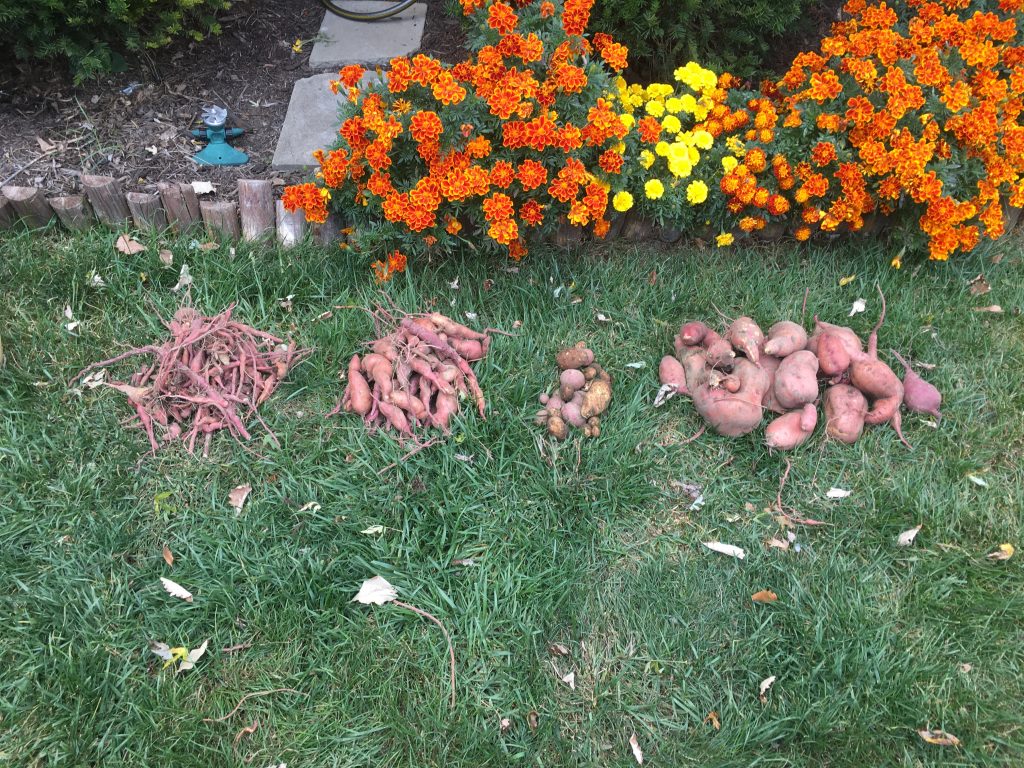Just a sweet potato
I harvested the sweet potatoes. More this year. Starting earlier helped, but it seems to be the number of starter plants themselves that has a greater impact on total yield. Next year, we’ll try that.

–Simon

Because the thought occurred now and it might be gone tomorrow
Just a sweet potato
I harvested the sweet potatoes. More this year. Starting earlier helped, but it seems to be the number of starter plants themselves that has a greater impact on total yield. Next year, we’ll try that.

–Simon
 This book has been on my read list for long time. And perhaps due to my old man mannerisms, I finally sat down to read this war memoir.
This book has been on my read list for long time. And perhaps due to my old man mannerisms, I finally sat down to read this war memoir.
And it is just that. The author, Eugene Sledge, having researched and compiled the historical errata to accurate specifics, and having completed this work much later in life, created a perfect balance of fact and personal observation. He never strays too far into emotional content, but through his directness (indicative of the academic he later became), one can clearly extrapolate how he felt at the time.
It is a story of the Peleliu and Okinawa campaigns of World War II. A historian myself, if I can so make the claim, it was not the first time I had read about these particular conflicts. It was, however, the first time I had read them through a firsthand account. And as I’ve stated, I believe it is these records of the common man that provide significant historical value.
The nature of this work renders it beyond my rights to critique, so I will leave it at that. If you want a primary source account of the two arguably most bloody Second World War campaigns, free from political asides and excessive loaded personal annotations, I have yet to encounter a finer example.
–Simon
The ramblings of Boomers
I’m amused by the extreme nostalgia Boomers have for their youth. I’m amused because, in their pining for a time lost, they fail to understand the irony of the supposedly better conditions of a time period that preceded their own attainment of power and influence. And yet, stubbornness prevents them from accepting blame for the results of their decades long scorched earth policy, instead choosing to enjoy the benefits of such exploitation while mentally lapsing into the times governed by their parents, all the while accusing the younger generations of laziness and motivational want despite the rather clear historical evidence that these younger generations acquired significantly higher debt to achieve the educational requirements for comparable wages of their older coworkers, if they were fortunate to even find such a job available.
A forced audience isn’t captivated
Such attitudes especially annoyed me during my college years. Not the professors themselves–no, they at least understood the consequences of unchecked Capitalism. At least, that was the case in my humble Arts and Sciences education. (Liz has a different opinion of her professors, having attended Business school, unsurprisingly.) Rather, it was the clientele with whom I regularly interacted while working those unskilled labor jobs in the service industry to make ends meet. The self-important 5PM rush of office jockeys, in a great hurry to acquire their expensive steak cuts and head home, in so much of a hurry that they couldn’t hang up their cell phones before trying to place an order, yet never so much in a hurry that they couldn’t complain endlessly about the service they received. The service that, in their mind, was unquestionably declining with the youth of present day, completely unlike how they themselves treated customers in their own pre-college graduation days of employment. I received lectures, free of charge for my own benefit no doubt, on my attitude in these instances where my thoughts weren’t perfectly hidden from my conduct. It was one of the rare occasions that a cell phone was actually put away, and inevitably led to the lamenting monologues about the good ol’ days.
Your favorite memories of childhood were things you never let your own kids do
During these good ol’ days, kids walked to school and played unsupervised. Kids had dangerous playgrounds and dangerous toys. Kids had access to nature and undeveloped land. Kids learned character through tough love and that prepared them with resilience for the workforce.
These were the general points incensed Boomer orators would espouse upon their involuntary audiences (me). Yet with time their captive Millennial audiences could no longer be forced, since as they advanced in their careers, many no longer found themselves in the positions of entertaining Boomers under the threat of being fired. So instead, the Boomers have taken to the internet to lament on the changing world.
After overhearing a Boomer at the hardware store commenting on the background music and how much better the music was in their day (another favorite Boomer conversational topic), I took to some internet trawling. Topics I wouldn’t normally search for. Modern takes on “You can’t go home again.” A topic that turned out to be Boomer clickbait gold. And like all clickbait–hundreds of articles with the same content.
So I offer you now, Boomers, without delving into the literary etymological origins of the phrase, the solution to your dilemma, for your benefit. You can’t go home again because:
The point:
Meanness is the social result of an insecurity. Every time you wax nostalgic to someone younger who didn’t experience your idolized timeframe, you are attempting to make that person feel bad (because nostalgia is itself a falsified version of events, and therefore not academically historical–not a history lesson as you seem to think it is). You are insecure because on some level you realize that what was lost is the result of your own actions, and you can’t mentally settle that.
So roll a joint, put on some Beatles, and shut up.
–Simon
Liz tried a second crop of carrots. Better this time, though the harvest was still small. I don’t think they’re the most energy-efficient vegetable to grow, but neither are tomatoes I suppose. Plus, they’re needed for those delicious mirepoix..es.


–Simon